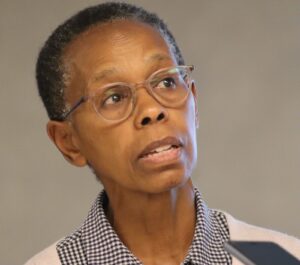
The 3rd EAC Regional Science, Technology and Innovation (STI) Conference came to a close in Nairobi Friday (8 March) during which three different policy documents were launched: The East African Regional Innovation and Technology Transfer Strategy, the East African Regional STEM Strategy, and the East African Regional Strategy for Indigenous Knowledge and Technology Systems.
The conference, which ran from Wednesday 6 March 2024, was hosted jointly by the East African Science and Technology Commission (EASTECO) and the Inter-University Council for East Africa (IUCEA).
Under the auspices of the East African Community (EAC), the conference was held in collaboration with various STI stakeholders in the region and globally in order to provide an avenue for sharing experiences, best practice and applications of STI outputs. It also served to strengthen collaborations, facilitate regional integration and enhance sustainable development.
The conference was closed by the Undersecretary in the Ministry of EAC Affairs of South Sudan, Beny Gideon, who is also the Chair of the EAC Coordination Committee. Other notable dignitaries present included Uganda’s Minister of State for EAC Hon James Magode, senior ministry officials from other partner states, as well as donor representatives. The Executive Secretaries of IUCEA and EASTECO, Prof Gaspard Banyankimbona and Dr Sylvance Okoth, respectively, were also present.
The overarching theme of the conference was, “Accelerating development and diffusion of Science, Technology and Innovation solutions for a green, inclusive and resilient East Africa.” This biennial conference builds on the deliberations and success of the 1st and 2nd conferences, which were held, respectively, in Kampala, Uganda in 2019 and Bujumbura, Burundi in 2021.
Mr Gideon said infrastructure development was key to achieving the STI resolutions made at the conference. “Let us closely implement them at the multisectoral level so that the 4th conference will be able to say what percentage has been achieved.”
Hon Magode said the conference theme was well aligned with the EAC Treaty and development strategy. “Science and technology impacts very positively on the society and you can therefore expect the support of the Government of Uganda in what you are doing.”
The three-day meeting brought together diverse actors in the STI system, including policy makers, industry players, academicians, researchers, innovators, students and development partners.
Other stakeholders attending the conference included representatives of EAC Partner States, the African Union, Regional Economic Communities, civil society, business and industry organizations, academic and research institutions, and development partners.
The conference was being held in a hybrid mode, through face-to-face and virtual platforms. Activities included a high-level policy dialogue, plenary sessions, an exhibition, and a ministerial session. Special sessions included sub-themes and case studies on a wide variety of pertinent topics.
Meanwhile, it was announced that the 4th EAC Regional Science, Technology and Innovation Conference will be held in Rwanda.
The Treaty for establishment of the East African Community (EAC) recognizes Science and Technology as a key driver for sustainable socio-economic development in the region. Further, the EAC Vision 2050 emphasizes STI as one of the key drivers for sustainable socio-economic development and calls on higher education institutions to mainstream research and innovation towards socio-economic transformation of the region.
Under its overarching theme, the conference engagement sessions are structured into four thematic areas, namely: (i) Agricultural Productivity, Resilience and Food Security; (ii) Health and Nutrition; (iii) Natural Resources Management; and (iv) Information Communication Technology and Digital Economy. All full paper submissions in the conference are peer-reviewed and evaluated based on originality, technical and/or research depth, accuracy and relevance to conference theme and topics. The accepted peer-reviewed papers will be published in the East African Journal of Science, Technology and Innovation (EAJSTI) to boost the dissemination of research findings within the region and improve regional visibility and competitiveness.
Related posts:
GO ELECTRIC LTD APPOINTS NEW CORPORATE DIRECTOR TO SPUR ELECTRICAL MOBILITY IN AFRICA
IEBC dismisses claims of Wetangula’s alleged ballots scandal
Info Out Of The Powerful US Leader Who Allegedly Brokered A Truce Between Ruto And Raila Odinga
Nairobi Prime Chief Officer Mosiria meets with Gusii Professionals





